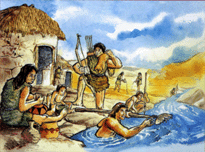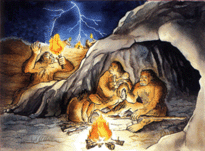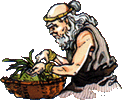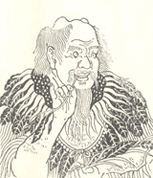Ancient Times (~ 2200 BC)

Antiquity 2200 BC
 During this period, different clans began to form, and survival was based on overcoming struggles with nature. As the early inhabitants hunted for food, they discovered that some foods could relieve illness while others were poisonous and could cause death. The discovery of fire was especially important because it allowed people to eat cooked food that was more easily digested.
During this period, different clans began to form, and survival was based on overcoming struggles with nature. As the early inhabitants hunted for food, they discovered that some foods could relieve illness while others were poisonous and could cause death. The discovery of fire was especially important because it allowed people to eat cooked food that was more easily digested.  At the same time, the generation of heat led to other findings. The earliest beginnings of using herbs, acupuncture, and moxibustion to cure disease were seen. While using hot stones to warm themselves, inhabitants realized that pressing them against certain parts of the body could help alleviate certain sicknesses. They also found that by using bone needles and pricking themselves in a particular spot could relieve pain in other areas of the body.
At the same time, the generation of heat led to other findings. The earliest beginnings of using herbs, acupuncture, and moxibustion to cure disease were seen. While using hot stones to warm themselves, inhabitants realized that pressing them against certain parts of the body could help alleviate certain sicknesses. They also found that by using bone needles and pricking themselves in a particular spot could relieve pain in other areas of the body. 
In addition, there were clan members who became specialists in these techniques, and were known as shamans (wu). The practice of medicine was very much integrated with magic to cure illness.
The Yellow Emperor and the Fire Emperor
Two well-known legends at the time were those of the Yellow Emperor whose name was Huang Di, and the Fire Emperor who was bestowed the title Shennong. Shennong has numerous meanings in Chinese such as "divine farmer", the "heavenly husbandman", and a more modern interpretation as a distinguished doctor. It is unclear whether these emperors actually existed but some historians date their existence back to 2500 - 2700BC. 
Both of these important figures are the attributed author's of two well-known books that have contributed significantly to Traditional Chinese Medicine. These are the Huang Di Nei Jing (The Yellow Emperor's Medicine Classic) and the Shennong Bencaojing (Classic of Herbal Medicine). In actuality these books were written much later in history. It was common in ancient time's for the Chinese authors to assign authorship of books to the great teachers or important persons who influenced them.


